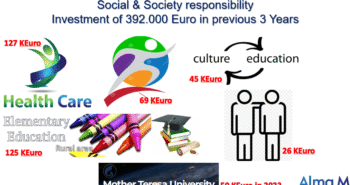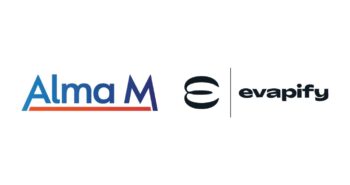“Ivica Petrović: Cooperation with the world’s largest companies is a confirmation of the success of ‘Alma – M'”.
Ivica Petrović has 25 years of experience in the FMCG sector. As a graduate economist, he gained his first experience in retail, distribution, and the operational processes of a large multinational company in 1998, at the Unilever representative office in Skopje. His career then continued in two local distribution companies, and in 2006, he joined…

Ivica Petrović has 25 years of experience in the FMCG sector. As a graduate economist, he gained his first experience in retail, distribution, and the operational processes of a large multinational company in 1998, at the Unilever representative office in Skopje. His career then continued in two local distribution companies, and in 2006, he joined the team of Nestlé Macedonia as a Key Account Manager, later becoming Sales Manager for Macedonia and Kosovo.
As a successful manager, he became part of the sales team responsible for one of the largest international buyers, Tesco, in Poland. Since 2016, he served as National Key Account Manager in Serbia.
In 2022, he returned to Macedonia and joined the team of Alma-M as General Director.
The company Alma-M has been on the market for 33 years. What challenges have you faced since taking the position of General Director in 2022?
Although I have been connected with Alma-M since 2006 and am well-acquainted with most of the company’s processes and ways of functioning, the position itself was still a significant challenge for me.
At first glance, the sales department seemed to pose the least challenge, as I came from a similar position. However, the sheer size of the team and the complexity of operations was truly a major change for me.
A much greater challenge was understanding the details of the day-to-day operations, the mode of functioning, and the interconnection between the other departments—logistics, finance, and sales. Together with the team, we identified the challenges they face in daily operations and worked on finding ways and opportunities to overcome them.

“Alma-M” began as a family-run company, and for future leadership, the company decided to adopt professional management instead of traditional family governance. If we consider the role of owner/founder of an organization and the role of a manager — does it matter who leads the company? In which areas have you contributed to improving the company, and what existing visions have you embraced?
The success of the company is owed to the vision of Mr. Muarem Murtezani, who aimed to build a company recognized for the quality and services it provides.
Sharing the same vision — both for the development of Alma-M and for my own professional growth — I decided to accept the challenge and continue with the same pace, working on developing the company and improving its processes.
The main focus in the past period was on simplifying existing processes and procedures, increasing transparency in operations and communication between all departments, sharing knowledge and experiences, and making the right decisions aimed at improving the quality of service we provide to our clients.
One of the key projects we implemented recently was related to the sales team, where we re-adapted the existing operational model, taking into account the specifics of each type of sales outlet to ensure complete and effective market coverage.
To support the advancement and growth of the business, a Board of Directors was also established, headed by Mr. Samet Murtezani, with members Mr. Amdi Murtezani and Ms. Belma Murtezani. This change brings new value — a professional approach to managing the company not only in Macedonia but also in the overall business of the group.
All changes initiated over the past two years are a clear commitment to continuing the path of success — a path now defined and implemented by a professional management team.
By stepping away from daily operational tasks, Muarem Murtezani now has more time to focus on defining strategic directions for the development of our well-established companies and businesses in Albania and Kosovo, as well as launching a new venture in neighboring Serbia.
How many products do you have in your portfolio, and which are your sales leaders? What does a company need to become your partner?
Our portfolio is focused on the food sector, covering the following product categories:
- coffee
- chocolate beverages
- soups
- mayonnaise
- spices
- nutritional additives
- chocolate impulse products
- pet food
- cereals
- infant formula substitutes
- chewing gum
- dairy products
- fruit yogurts
- appetizers
- cheeses (kashkaval)
- ice cream
We currently offer approximately 1,000 products, along with an additional 54 items tailored for the HoReCa segment (Hotels, Restaurants, and Catering).
Almost every product we sell is a category leader, including:
Wrigley chewing gum, Nescafé, Dolce Gusto capsules, Thomy, Nesquik, Pedigree, Whiskas, Mars, Snickers, Bounty, Twix, M&M’s, Jugobela, Zottis, Froneri, and Mars ice creams.
Notably strong performers include:
- Nescafé Classic
- Nescafé 3-in-1
- Wrigley chewing gum
- Thomy mayonnaise
We are open to collaboration with any company that has a long-term strategy for market presence and is committed to growth and development.
What kind of capacities do you have in terms of warehousing, fleet, and human resources? Are there any investment plans for expanding your operations?
Currently, the company has 292 employees working across various departments, with around 50% involved in sales operations.
We operate on a total area of 36,000 m², including:
- 9,000 m² of warehouse space, with a storage capacity of about 16,500 pallets. These facilities meet the highest standards required by the multinational companies we represent.
- Of that space, 2,200 m² are temperature-controlled (from 4°C to 8°C), with capacity for 1,800 pallets.
- Additionally, we have freezing chambers spanning 500 m², with 900 pallet spaces, primarily used for ice cream storage.
Our vehicle fleet consists of more than 250 vehicles, including approximately 60 trucks, delivery vans, and ice cream delivery vehicles.
What is your strategy for attracting and retaining employees? Do you believe that work permits within the Open Balkan initiative will disrupt an already fragile labor market?
In addition to our strong focus on ensuring that our employees receive the best benefits and advantages within our sector, we continuously invest in education and skills development for each individual. We strive to create a sense of belonging and offer opportunities for long-term career growth within the company.
Whenever possible, we aim to fill open positions with internal talent, and I’m proud to say that in the majority of cases, we succeed in doing so.
The Open Balkan initiative will certainly challenge us to be even more creative and competitive compared to companies from Serbia and Albania, in order to retain our workforce and keep them motivated to stay within our company.

How do you define successful operations? What do you consider your key strengths, and what sets you apart from the competition?
Success, in our view, depends on understanding the priorities of our principals — ensuring that every product we represent is accessible and finds its place in the consumer’s basket. That understanding shapes how we measure our success.
A satisfied end consumer, satisfied employees, satisfied clients and principals, and long-standing collaborations with the world’s leading companies — such as Mars and Wrigley for nearly 30 years, Nestlé for over 17 years, and Zott for more than a decade — are all strong indicators of Alma-M‘s success.
This has been achieved through continuous learning, trend awareness, embracing change as a key component of development, persistence, a motivated and content team, and taking concrete actions — all of which are prerequisites for continuous growth and success.
To what extent do you follow trends in technology and software solutions? How much have you invested in this area?
Today, keeping up with technological trends is not a choice — it’s a necessity. Our company continuously invests in software solutions, enhancing existing systems.
Recently, our primary focus and investment have been directed toward adapting existing systems and creating new solutions that improve efficiency, minimize human error, automate processes, and free up resources — all to raise the overall quality of operations.
Global and local distribution markets have faced major fluctuations — product shortages, fixed pricing, inflation. What has your company learned and changed as a result?
We live in highly dynamic times, with many unpredictable challenges, and the ability to react quickly has become a key factor for success. This pace of change teaches us the importance of greater transparency in communication — across the entire chain, from producers to buyers — because the challenges we face are shared.
How would you describe the current state of the distribution sector in North Macedonia? What key improvements are needed to strengthen the work of distribution companies?
Improving the distribution sector means improving the entire supply chain — from manufacturer to end consumer. This involves increasing transparency, simplifying processes, and embracing digitalization and electronic integration with retail chains for better data exchange, ultimately improving quality and efficiency.
However, the most important element remains people: their education, motivation, transparent communication, and providing a clear path for personal and professional growth within the company.
What results do you expect this year? What are your goals for next year? Can we expect new products, brands, or investments?
We have ambitious yet realistic goals — focused on achieving sustainable business growth and organic expansion by enriching our current portfolio with new brands and programs.
Innovation in product development is a defining trait of our partners, and this year we expect to expand our offering with new products and flavors. One of our priorities is also the development of the HoReCa segment, for which we’re working to build a dedicated portfolio to meet its unique needs.
We have the capacity, capabilities, professional staff, and know-how, and we are currently in the final stages of negotiations with a new partner, whose brand will help us reach our set objectives.
Recommended Articles
-
Our Commitment to Social Responsibility
3 months ago139 views -
CHOKO Mars, Petcare, Macedonia
5 years ago463 views -
Birth of Alma-M
34 years ago466 views -
T-Mobile Macedonia
21 years ago478 views






